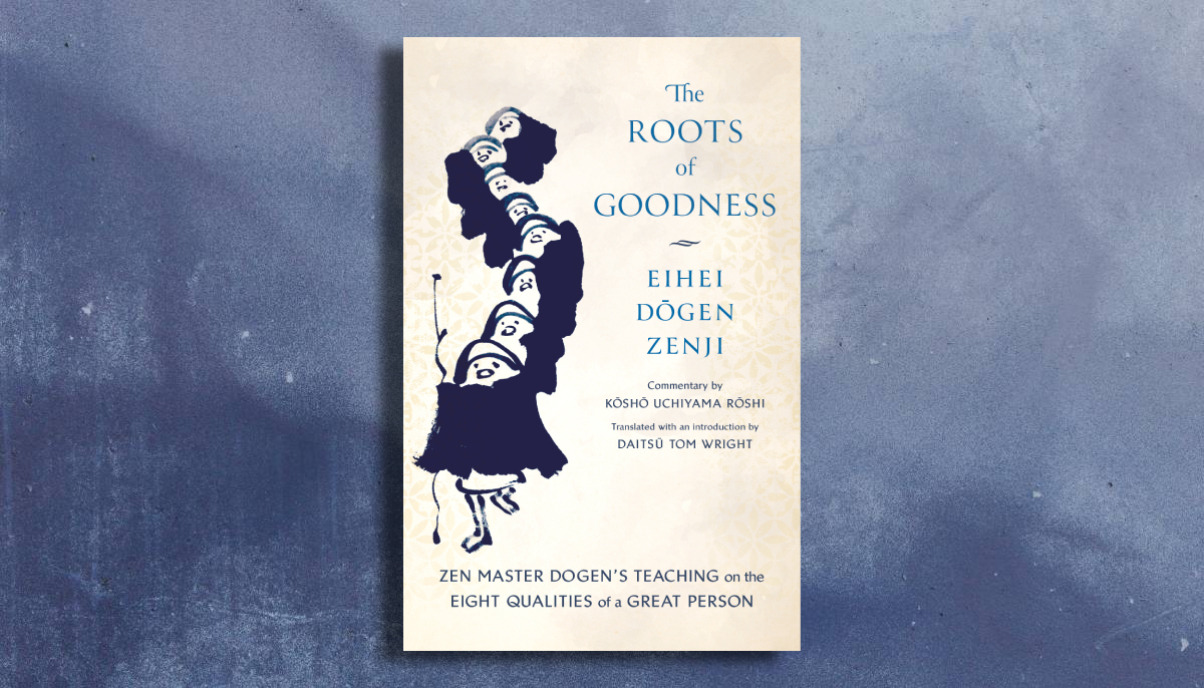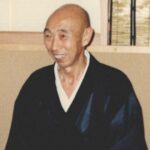Constance Kassor’s review for Buddhadharma:
The Yuikyogyo, or the Sutra of the Buddha’s Last Teachings, is believed to be the final teaching that Shakyamuni Buddha delivered on his deathbed before entering parinirvana. Centuries later, in 1252, the Zen master Dogen referenced the Yuikyogyo while composing the 95th fascicle of his Shobogenzo. This would also turn out to be Dogen’s last teaching; he passed away just months after beginning to write this section of his renowned text.
This final section of the Shobogenzo is titled Hachi Dainin Gaku, or The Eight Qualities of a Great Person. As the name suggests, it outlines eight essential qualities that a bodhisattva should cultivate: (1) having few desires, (2) knowing one has enough, (3) appreciating serenity/quietude, (4) making diligent effort, (5) not losing sight of true dharma, (6) concentrating on settling in dhyana, (7) practicing wisdom, and (8) not engaging in useless argument.
Daitsū Tom Wright’s The Roots of Goodness presents an English translation of Dogen’s Eight Qualities of a Great Person, accompanied by an extensive commentary by Kosho Uchiyama Roshi, the teacher from whom Wright received ordination in 1974. In his introduction, Wright describes these eight qualities as “signposts” to help guide practitioners on the bodhisattva path.
Uchiyama Roshi’s commentary emphasizes that Dogen’s teaching shows practitioners how to become adults (otona). That is, while many ordinary people remain childish beings who are consumed by desires for wealth, status, or material possessions, buddhas embody the adult qualities of maturity and wisdom. The commentary connects Dogen’s teachings to contemporary issues, making the text feel personal and relevant. Wright’s background — his participation in the civil rights movement, his conscientious objection to the Vietnam War, and his eventual journey to Japan where he studied under Uchiyama Roshi — further enriches the translation. His experience underscores how Zen practice can be harmonized with activism, making this work not only a spiritual guide but also a call to ethical engagement in the world.
[Please note that the text from which this excerpt derives makes use of footnotes and diacriticals; these are not represented in this excerpt.]
Excerpt:
The first quality is having few desires. That is, not wildly chasing after the objects of one’s desires [of the five senses] that have not yet been fulfilled is what is called having few desires.
The Buddha expounded, “Monks, here is something you need to be aware of. A person with many longings or cravings suffers proportionately greater, precisely because he or she seeks greater personal gain or other benefit. When one pursues few desires, there will be less suffering and fewer troubles. Personally having few desires needs to be thoroughly studied and practiced. Moreover, not following those cravings engenders uncountable merits. A person with few cravings will never try to flatter or ingratiate themselves with another. Nor would one of few desires be dragged around by the cravings of the five senses. One whose heart acts with few desires is always at peace and has few anxieties or misgivings. And regarding various matters, such a person feels no need for more; one always has more than enough. In a word, one with few desires is virtually in nirvana. This is what is called having few desires.”
You’re such an idiot! Why did you refuse something that was being given to you?
These opening lines are not particularly difficult. Reading them two or three times, you can pretty much get the gist. First of all, in Buddhism, the term goyoku (five desires) refers to the objects of the senses of sight, sound, smell, taste, and touch. These objects become an agent or medium for arousing that desire. So they’re called the five desires. More concretely speaking, these five desires have also been listed as desire for wealth, sex, food and drink, sleep, and fame. Maintaining an attitude of not chasing around here and there after the unfulfilled target of the five senses is referred to as having few desires.
What we can see here is that in Buddhism desires are not something negative to be denied or gotten rid of. Among non- Buddhist ascetics in India, there were some who greatly emphasized abstinence or self-control. Nowadays, I have the feeling that there are very few outside of these non-Buddhist ascetics who seriously make desires the enemy, railing about abstinence or being free of desires or severing or destroying all desires. At the same time, I can imagine there are plenty of Japanese who pay lip service to the idea of having no desires. However, you should know that in Buddhism there is no such talk about having no desires or abstaining or cutting off desires. There is nothing that says desires are so bad that they must be some sort of object of hostility, since, to the contrary, desires are necessary for us to live. Desire or appetite is one aspect of the life force. In short, if we had no desire to eat, we would die in a very short time.
The issue here centers on Dōgen’s passage about “not wildly chasing after the objects of one’s desires [of the five senses] that have not yet been fulfilled.”
In his book Heiwa no Daishō (Indemnification for Peace), Yōnosuke Nagai writes: “Most people are likely to think that a lion will kill and devour all prey that it sees; however, this does not appear to be true. In Africa, it is said that when a zebra or giraffe concludes that the nearby lion has eaten and is full, it will forage and eat or play without any fear whatever. It shows that the animals’ intuition or sense of danger is very astute. And, if it decides that the lion is on the hunt, it will flee in a hurry. In other words, if the lion is hungry, it will go out and hunt, but if it is full from eating, it will refrain from going out on a kill.” This is said to be the posture or attitude of animals in the natural world.
However, this does not seem to hold for that animal called Homo sapiens, the animal with supposedly advanced powers of intellect. For example, let us say there is a rather weak country nearby. Despite feeling no instinctual urge to extend its arm, the stronger country will eat it up just because it can. Despite not feeling particularly hungry at all, it is Homo sapiens that reaches out and takes. Concretely speaking, it’s something like what the United States did in Vietnam. Without a doubt, the United States is currently the wealthiest nation in the world. That huge country just reached out for Vietnam, thinking that if it doesn’t do it, either the Soviet Union or China might try to take over. They assumed that if the Soviet Union or China were eventually to get strong enough, they might even come after the United States itself. So even though it isn’t particularly hungry, it lashes out and tries and take over a tiny country. Of course, the same can be said for the Soviet Union or China. In any event, they mutually act out in a way whereby they chase desires as greedily as they can, resulting in all the problems that are arising here and there all over the world. These are not true examples of desire. They are examples of thought- up desires of avarice or greed. They are nothing more than images mutually created in the minds of people assuming that if they don’t strike now and take whatever they can, later they will suffer.
I read that during World War II, there was a tribe of cannibals living in New Guinea. The people there must have thought, Why is it that so-called civilized nations kill so many people, but don’t even eat them. What a bunch of barbarians. Cannibals only kill people for food. It’s said that when they happened to kill someone during battle, eating that enemy would be done as a ritual. They couldn’t understand why anyone would slaughter so many people and not eat them. At any rate, even when “civilized” people aren’t even hungry, their imaginary desires go into overdrive and they become as greedy as they possibly can, because that’s become their common sense.
When you think about it, perhaps it’s simply because that is what children are taught by their parents. You know, a kid goes to a neighbor’s house and the auntie there wants to give the kid something, but the kid has no desire for it and goes home without anything. And their mother says, “You’re such an idiot! Why did you refuse something that was being given to you?” That now passes for common sense.
Now, I was born and raised in Tokyo. In Tokyo, if you try and set a planter out in front of your house, for sure it will just get broken. When I was just a kid myself, I recall that right inside the gate to our house, there was a clump of bamboo and a sparrow decided to make a nest. This was just after the Great Kanto Earthquake in 1923. I was so looking forward to seeing the baby sparrows fly out of that nest for the first time. However, one night, someone brought a ladder, climbed over a ditch, and knocked the nest down. So all the eggs fell on the street and broke. Ever since then, I never really liked Tokyo. Even before that, there were things I didn’t care for about the city, but after that I really began to detest Tokyo.
It seems that there is a streak in some Japanese that tries to kill anything that can be killed. That’s just no good. However, Kyoto somehow seems different to me. Along the Kamo River, there’re lots of birds playing. You can see plovers and wagtails. And the black- headed gulls are all over the place. Even within the center of the city, you can see many sparrows, and doves, too, are everywhere. People coming from Tokyo often remark on how nice Kyoto is. They’re often impressed that you can walk down the street and see planters here and there. They’re surprised to see planters with flowers blooming that don’t get stolen. This just seems bewildering to Tokyoites. And besides that, the people in Kyoto never looked down on a monk like me who went around surviving by takuhatsu. I think this was due to the graciousness of the people of Kyoto.
For fourteen years, I lived thanks to the offerings of the people of Kyoto who graciously filled my bowl when I went on takuhatsu. As most people know, mendicant begging was the sole source of income at Antaiji, so we had to go out almost every day. In the mornings, there was rice porridge, and around noontime we would buy a roll or two somewhere to stave off hunger. Then, we would usually duck into the grounds of some small temple to eat it. Now, if there were any pigeons on the grounds, they would come over and coax us to give them a little bread. That’s when I realized why the local people always put something in our bowls. We were the same as the pigeons who gathered around us and with whom we shared a bit of our bread. There are all kinds of temples in Kyoto. There are little out-of-the-way ones, and there are big rich ones like Hongwanji or Rokkakudō. The pigeons at the big temples were just shameless. They’d come straight up to you and pluck the bread right out of your hand. After a while, we just never felt like taking a break at either of those places. But the pigeons at Tōji were very different. When we would start to eat our bread there, the pigeons always held back at first. And when we tossed them some crumbs, they still acted constrained and finally pecked at the crumbs. Those pigeons really were quite cute.
Ah! I finally realized that on takuhatsu, too, we must never act as shamelessly as the pigeons at Hongwanji or Rokkakudō but be more modest like the ones at Tōji.
What I also felt then was that the reason Kyoto was not firebombed during the war was not just due to the many temples and shrines located here. It was also thanks to the graciousness of the people of Kyoto. Even before the war, many Americans had been coming to Kyoto. As they encountered the people of Kyoto, I’m sure they truly felt that this was a nice city. No matter how many temples and shrines there might be, if people hadn’t gotten a good feeling when they interacted with the residents of Kyoto, I’m sure they would have thought, Let’s just burn it down. In other words, what’s important here is that feeling of graciousness; when you see a monk on takuhatsu, give them a penny or two; if you see a pigeon, give it a portion of your bread—that is why Kyoto wasn’t burned to the ground even during the war.
During my time, people just put a one- yen coin in my bowl. And if you needed an eggplant, you would hunt around until you found a place where you could get an eggplant for even one yen cheaper. Still, people maintained that inner margin to give a whole one yen to a monk out begging. That’s the kind of spirit I’m talking about.
It’s not a spirit of being as greedy as possible and taking whatever you can. We just can’t act that way. It’s a spirit of trying to give, even if it’s only a little bit; it’s a natural spirit of self-restraint, of reducing one’s desires. That’s having the wisdom of a great person. The dainin in Hachi Dainin Gaku is like that.
From The Roots of Goodness: Zen Master Dogen’s Teaching on the Eight Qualities of a Great Person by Eihei Dogen Zenji, commentary by Kosho Uchiyama Roshi, translated with an introduction by Daitsu Tom Wright. Translation © 2025 by Daitsu Tom Wright. Reprinted in arrangement with Shambhala Publications, Inc. Boulder, CO.




